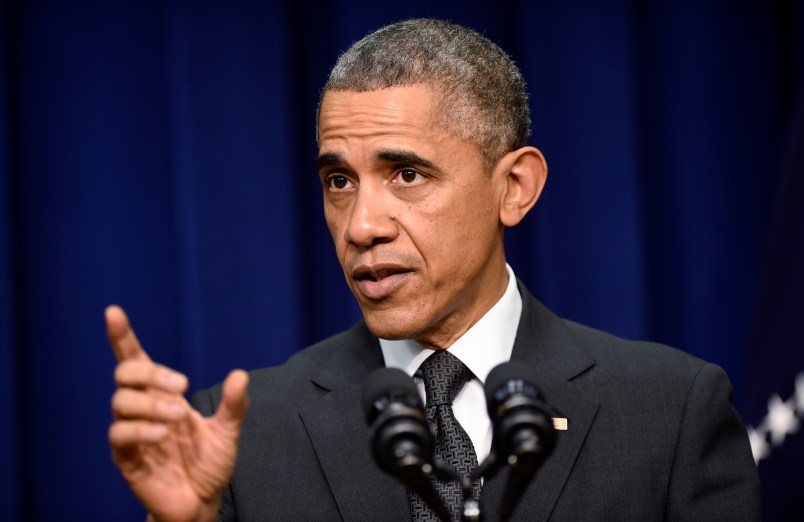A federal judge in Pennsylvania ruled on Tuesday that President Barack Obama’s recent executive actions on immigration are unconstitutional.
“The Court holds that the Executive Action is unconstitutional because it violates the separation of powers and the Take Care Clause of the Constitution,” wrote U.S. District Judge Arthur J. Schwab, who was appointed by George W. Bush.
Schwab determined that Obama’s actions — which pave the way for three-year work permits for more than 4.4 million people (those brought to the U.S. as children and undocumented parents of American citizens) — were illegal because they permit “substantive rights” for “broad categories” of individuals.
The judge quoted past statements by Obama suggesting that granting deportation reprieves to more undocumented immigrants would exceed his executive authority. “President Obama has stated,” Schwab wrote, “that he is constrained from issuing an Executive Action/Order on immigration because such action would exceed his executive powers… While President Obama’s historic statements are not dispositive of the constitutionality of his Executive Action on immigration, they cause this Court pause.”
Echoing a common Republican argument, the judge suggested that under Obama’s rationale, a future president could instruct the IRS to collect a lower tax rate than established by law and “defer prosecution of any taxpayer” who pays the lower rate.
In a lengthy memo, the Obama administration explained its legal rationale for the move, citing Supreme Court precedent about broad “prosecutorial discretion” under the Constitution when it comes to executive branch enforcement of immigration laws, and actions by prior presidents who have granted “deferred action” to categories of unlawful immigrants.
Schwab wrote in his ruling that Obama was legislating. “Congress’s lawmaking power is not subject to Presidential supervision or control,” he wrote. “Perceived or actual Congressional inaction does not endow legislative power with the Executive.”
The case concerns a Honduran man who was arrested and detained by the Department of Homeland Security for re-entering the U.S. illegally after he was removed. The case is about “arguably unequal and arbitrary immigration enforcement” in the U.S., the judge wrote, noting that he moved to consider Obama’s executive action out of concern for whether it “would impact the sentencing of this Defendant.”
Gregory Siskind, a Memphis-based immigration lawyer, saw partisan undertones in the ruling.
“Wow, this judge really went out of his way to get to issuing this. Neither the government nor the defendant raised this [question about the executive action],” he said in an email. “His language looks pretty partisan — ‘sanctuary cities’? Quoting President Obama as a source of legal authority here is also too cute by half. The President is not a court nor was he speaking as a legal scholar. A speech is not a legitimate source to cite here.”
The Justice Department slammed the ruling.
“The decision is unfounded and the court had no basis to issue such an order. No party in the case challenged the constitutionality of the immigration-related executive actions and the department’s filing made it clear that the executive actions did not apply to the criminal matter before the court. Moreover, the court’s analysis of the legality of the executive actions is flatly wrong. We will respond to the court’s decision at the appropriate time,” a Justice spokesperson said.
Sen. Bill Nelson (D-FL) told reporters in the Capitol, “I think that’s an incorrect ruling.”
The case is U.S. v. Elionardo Juarez-Escobar. Read the ruling below.
This article has been updated.







“wrote U.S. District Judge Arthur J. Schwab, who was appointed by George W. Bush”
Need we say more?
So similar actions by Presidents Reagan and HW Bush were illegal also?
What the President did was to employ prosecutorial discretion–which is one of the things that presidents (or at least administrations) do every day. The Third Circuit will knock this decision down, probably without delay.
From Wikipedia: “It was Schwab, who in 2003, presided over the case involving Tommy Chong for conspiracy to distribute drug paraphernalia (bongs), and sentenced him to nine months in federal prison, as well as a hefty financial penalty.”
This judge is just plain evil.
Well, remember that for more than two centuries, nobody had a problem with recess appointments, either, until the black president made a few.